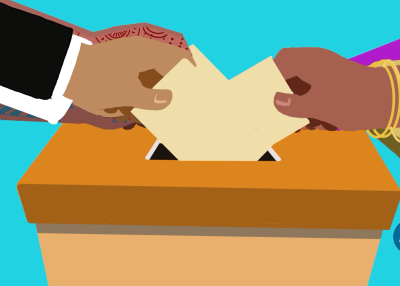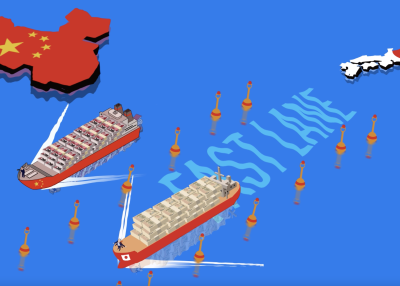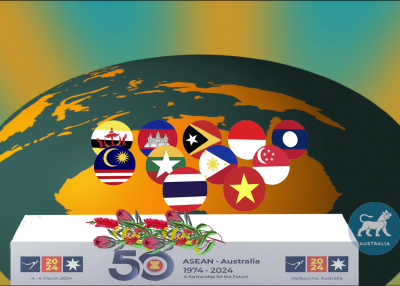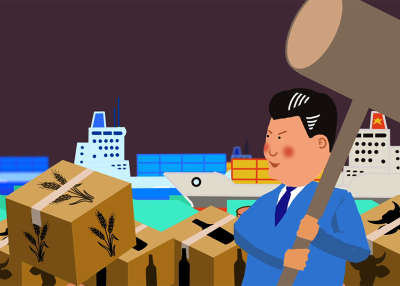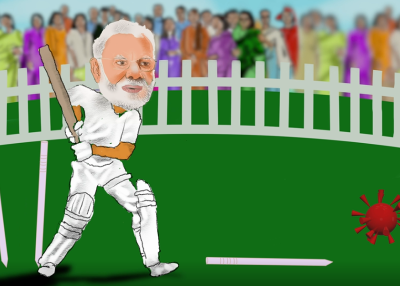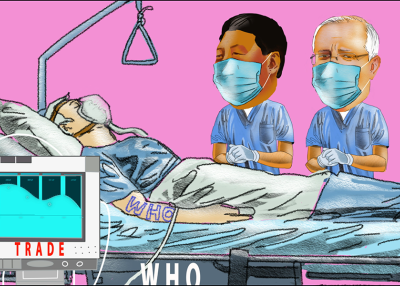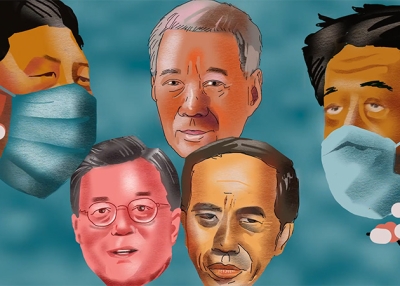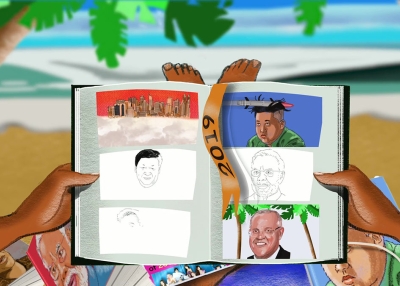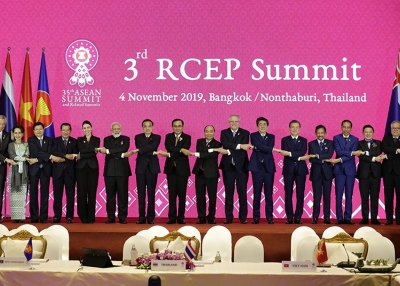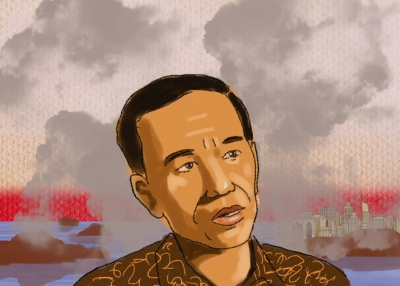Briefing MONTHLY #4 (3) | ASEAN-Australia Special Summit (Fri-Sat edition)
17 March 2018 | Getting down to business | Joining ASEAN? | Vietnam | Peter Coleman, CEO of Woodside on energy
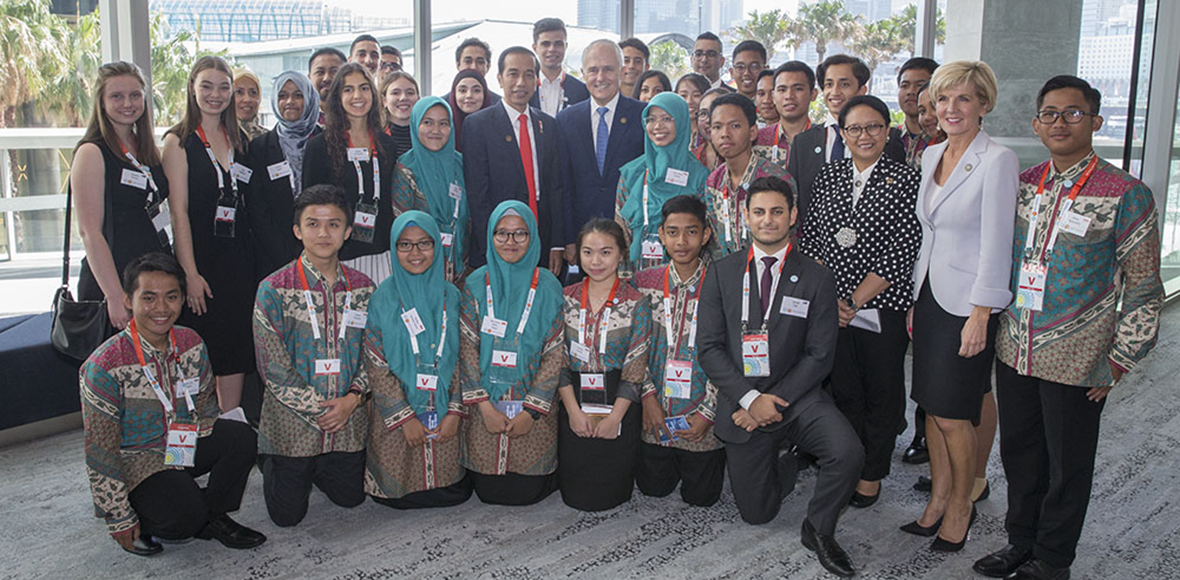
Prime Minister Malcolm Turnbull and Indonesian President Joko Widodo meeting young leaders from diverse religious faiths in Sydney on Saturday. Image: ASEAN-Australia Special Summit
This week, BRIEFING MONTHLY Editor is reporting from the ASEAN Special Summit week in Sydney. This is the third installement. The Turnbull government has responded cautiously to Indonesian President Joko Widodo support for Australia joining ASEAN. But the focus at the Summit today will now shift to winning stronger anti-terrorism cooperation across the region and identifying potential new business cooperation.
GETTING DOWN TO BUSINESS
Institutional business links between Australia and ASEAN have been strengthened in the days leading up to the Leader’s Summit in a bid to cut through the cultural differences which are often said to hold back new trade and investment.
Digital trade: Australia announced a digital trade standards initiative to support the development, adoption and use of international digital trade standards. Trade minister Steve Ciobo said: “Harmonised international standards applied across our region will reduce the costs for Australian business when exporting and importing products and services.” The small and medium enterprise conference on Friday saw much discussion of how the rapid uptake of digital devices had fostered both technical and cultural leapfrogging in regional business practices. Vietnamese entrepreneur Le Hoang Uyen Vy said digital marketing techniques made it easier than before to test products across national borders and even into second tier cities without having to set up costly new infrastructure.
Councils meet: Several Australian peak industry groups held their first meeting with the Kuala Lumpur-based ASEAN Business Advisory Council (ABAC) on Thursday in an attempt to foster new networks and understanding of the ASEAN Economic Community. The gathering heard briefings from the CSIRO on research it is doing in northern Australia on agricultural supply chain issues and from the Australian Digital Commerce Association on the role blockchain technology might play in digital commerce. Australian Chamber of Commerce and Industry international director Bryan Clark said the ABAC members had stressed how they were more interested in the potential for new services trade and investment rather than resources trade. “They had the sense that Australia was still relying on its commodities strength when they thought ASEAN business was moving on,” he said. The ASEAN businesspeople also complained about business visa access to Australia and pressed the Australian participants to support a new ASEAN visa system.
Entrepreneur network: The NSW government is providing financial support to a scheme to bring young Southeast Asian entrepreneurs into the Sydney start-up scene. And the relatively new Australia-ASEAN Business Council has developed a link with the ASEAN Young Entrepreneurs Council to increase contact between start-ups in Australia and Southeast Asia. The Singapore-based founder of accelerator company Gemstar, Gemma Manning, told a gathering of ASEAN entrepreneurs that too many Australian start-ups failed in the region because they didn’t understand enough about the local market conditions.
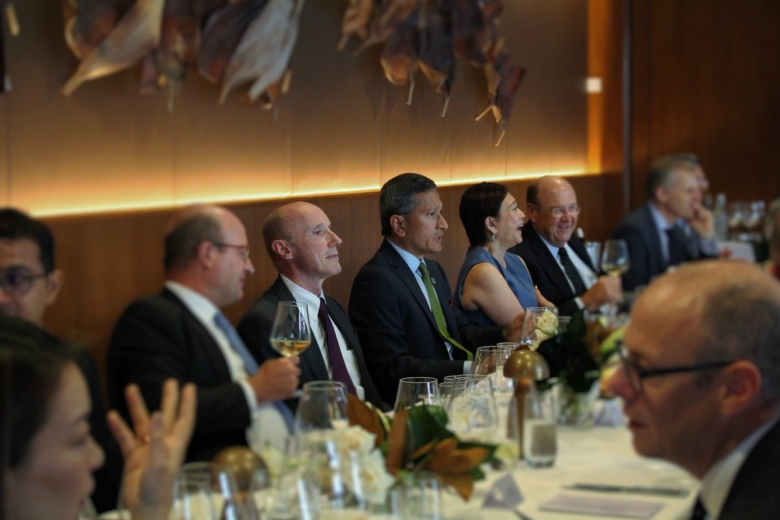
Dr Vivian Balakrishnan, Minister for Foreign Affairs, Republic of Singapore (fourth from left) speaking with guests of the Asia Society Australia - Singtel Optus 'Leaders on Asia' event on the eve of the Summit.
BETTER FROM THE INSIDE
A survey of businesses operating in ASEAN suggests they have more positive outlook about the economic growth and integration in the region than the broader universe of businesses in Australia. The survey by AustCham ASEAN found that 87% of participants planned to increase their trade or investment in the region in the next five years, while almost none planned to reduce their operations. And the third edition of the survey conducted via bilateral business chambers in the ASEAN countries showed a more optimistic attitude about growth prospects than the two previous editions. Forty-four per cent of respondents expect activity to increase compared with 26% in 2016. The three largest drivers of growth are the growing consumer class, regional integration and improvements in infrastructure. The latest survey was supported by the Australia-ASEAN Council.
Singapore Foreign Minister Dr Vivian Balakrishnan at the Asia Society Australia’s special 'Leaders on Asia' dinner in partnership with Singtel Optus shared his assessment of the geopolitical and geoeconomic landscape in Asia with the CEOs and Chairs of Australia's leading companies on Thursday night.
FREEZING BLACK MONEY
It is hard to go past AUSTRAC’s Codeathon for an example of how Australia has made this ASEAN Summit “special” with some unusual but practical things happening on the sidelines. The financial watchdog says the winning team Project Iceberg managed to come up with new ways of monitoring illicit financial activity going on in real time … and all in 32 hours. The Codeathon gave teams drawn from private and public sectors and universities across the region a series of challenges dealing with cybercrime and terrorism financing. The practical cooperation at the technical should help underpin the Leaders Summit plan for greater government cooperation on terrorist financing.
TO JOIN OR NOT TO JOIN
The Australia government has reacted cautiously to Indonesian President Joko Widodo’s support for Australian joining ASEAN in apparent recognition some other countries are unlikely to support the idea. Prime Minister Malcolm Turnbull said: “We’re really honoured and touched by the warmth of his remarks about Australia … But ASEAN matters are matters for ASEAN. We have the greatest of respect for ASEAN, the way it reaches it’s own conclusions.” Foreign minister Julie Bishop said "it would be a matter for all 10 ASEAN states to consider the admission of new members and should such an honour be extended to Australia, of course we would consider it very seriously". Meanwhile the two countries are giving different signals over the outlook for a bilateral free trade agreement with Widodo suggesting he would push officials to conclude “technical issues” this weekend. However, speaking before Widodo’s comments, Trade Minister Steve Ciobo only said he hoped the agreement could be settled this year. The two countries had previously aimed to finish it late last year.
THE ART OF THE SUMMIT
The Sydney Biennale has front run the expected Leaders Declaration focus on the need for more people to people engagement by including a substantial group of Southeast Asian artists in the festival, which is just getting under way. The Biennale launched the regional focus with a panel discussion on Wednesday where artistic director Miami Kataoka talked about the contemporary significance of Southeast Asian art and its contemporary significance including its diversity. Artists from Malaysia, the Philippines and Cambodia also talked about their work.
DEFINING INDO-PACIFIC
Australia and Indonesia are planning officials talks to discuss their approaches to the Indo-Pacific in a sign that Australia’s embrace of this new geo-political terminology might face some questioning within Southeast Asia. A statement after annual foreign and defence minister talks on Friday on the ASEAN summit sidelines said: “Indonesia acknowledged Australia’s Foreign Policy White Paper and noted the synergies with Indonesia’s own vision for the region. Australia was grateful for the briefing Indonesia provided on its own developing Indo-Pacific vision.” But at the ASEAN-Australia Dialogue earlier this week some participants ASEAN countries raised questions about Australia’s embrace of the Indo-Pacific in last year’s Foreign Policy White Paper and suggested ASEAN where still assessing their position. The ministers also agreed to finalise a plan for joint development cooperation in the Pacific suggesting joint concern about China’s increasingly active role in the South Pacific. Separately Indonesia and Australia signed a Maritime Cooperation Plan of Action which encompasses 85 separate activities involving 17 Australian and 20 Indonesian agencies.
VIETNAM GOES SHOPPING
Vietnam underlined its rising role within ASEAN (See Briefing MONTHLY #4 Special Summit Guide) a day after signing its Australian Strategic Partnership with a packed gathering in a Westin Hotel Ballroom on Friday to witness almost 20 cooperation agreements being signed. They ranged widely from coal shipment to cancer management, but aviation dominated consistent with Vietnam’s growing tourism popularity with 400,000 Australians visiting last year. Vietjet Air will be flying direct to Brisbane by next year with plans for more direct flights. Prime Minister Nguyen Xuan Phuc told the assembled crowd: “I call on investors to be quick to come to Vietnam or else we will not wait and others will take the opportunities away.”
DIPLOMATICALLY SPEAKING
“All of you have got the T-shirts now but I just want to reassure you this is not a religious organisation,” Filipino entrepreneur Joey Concepcion after handing out T-shirts emblazoned with the word AMEN (for ASEAN Mentorship for Entrepreneurs Network) at the Sydney Startup Hub on Thursday.
SUMMIT INSIDER: PETER COLEMAN
The 2017 Foreign Policy White Paper contains a promise from the Australian Government to “revamp our economic diplomacy to ensure it is better geared to support Australia’s commercial interests.” As the world teeters towards increasing trade nationalism, the urgency of this promise is increasingly apparent.
Alongside food and steel, the trade in energy and associated resources is closely linked to economic security and has therefore always been vulnerable to nationalist policies. Yet it is also a sector where free trade in goods, technology and capital has vast potential to lift living standards – and a track record to prove it. In the past decade, ASEAN nations have made huge progress in connecting their people to power. However, there is still some way to go before universal access to electricity is achieved: more than 10% of the region’s 640 million people remain without electricity and almost 40% still rely on solid biomass as a cooking fuel.
The ASEAN region has long been a major exporter of both coal and LNG but is beginning to turn to imports in recognition of the role trade plays in delivering energy security. This shift has been evident in Indonesia, the region’s biggest energy consumer, where the Arun terminal in north Sumatra switched in 2015 to supporting LNG imports as a regasification facility after 36 years as an exporting terminal – the first such conversion in the world.
Indonesia has also had the foresight to secure future gas supply, including through a long-term Sale and Purchase Agreement that Woodside has signed with Pertamina. This was our company’s first significant transaction with Indonesia and is a good example of how Australian and ASEAN companies can reach mutually beneficial outcomes.
Elsewhere in the region, there has been a proliferation of LNG importing terminals, with eight opening across Indonesia, Malaysia, Singapore and Thailand since 2011, facilitating both intra-regional and global trade in the fuel. These regasification facilities and the vessels that deliver LNG to them form a “virtual pipeline”, providing an increasingly cost-effective option for the distribution of gas and underscoring the close links between Australia and south-east Asia.
This region is no stranger to geopolitical wrangling – indeed managing Cold War tensions was the reason that ASEAN formed some 50 years ago. As we navigate a period of heightened geopolitical sensitivities, the exchange of energy resources and ideas is a good example of how ASEAN and Australia can work together to build our joint security and prosperity.
The two most significant international engagements by Prime Minister Malcolm Turnbull in 2018 so far, his visits to Japan and the United States, have each resulted in communiques pledging greater cooperation in Asian gas markets. In doing so, they reveal two unspoken points of contest. One is philosophical: a prevailing preference in many Asian nations for Government-to-Government energy trading and the dominance of State Owned Enterprises. The other is geopolitical: the presence of an alternative source of energy market development funding via China’s Belt and Road Initiative.
This contest of ideas and for investment could prove influential in shaping trade relations in a region that stands to benefit from continued liberalisation of trade across all sectors, including energy. The Australian Government has made a down payment on its commercial diplomacy revamp, securing wins on US tariff exemptions, agreeing bilateral communiques to work together to develop third-party markets, and hosting the ASEAN-Australia business summit. It’s a good start: in an increasingly competitive international trade environment, there may need to be more to come.
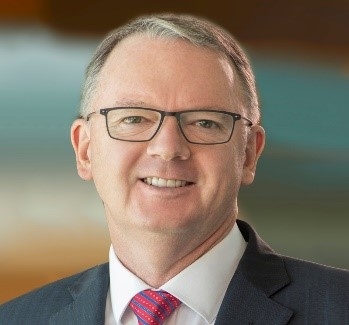
Peter Coleman is Woodside Energy chief executive officer and co-chair of the the energy roundtable at the ASEAN-Australia CEO Forum on Saturday. He is an Asia Society Australia Advisory Council member.
COMMENTARY
Disagree don’t disengage: “A good relationship offers the opportunity to engage south-east Asian leaders, and to argue for increased public space and attention to rule of law. Disagreement, not disengagement, is the better solution.” Aaron Connelly in The Australian Financial Review.
Shaping the future: “There will be events our region won’t expect. But we can shape policies that promote economic openness and support rules that make us more secure and more prosperous.” Jane Duke in The Malaysian Insight.
Time to diversify: “Singapore, Malaysia, Vietnam, and Thailand’s overall trading relationship with Australia is greater than what would be expected based on distance.” Khoon Goh in ANZ bluenotes.
Trade should top agenda: “The summit comes at a time when leaders in ASEAN and Australia confront several strategic choices. None is more important than how they respond to the threat to the global trading system, the foundation of East Asia's prosperity and a critical element in its security.” Mari Pangestu and Peter Drysdale in The Australian Financial Review.
HERE IS TODAY'S AGENDA
Asian business: About 120 mostly chief executives from Australian and ASEAN companies will break into roundtables to discuss potential new areas of business engagement including infrastructure, tourism and aviation, energy, agribusiness supply chains, digital disruption and advanced manufacturing. These roundtables will report to the Leaders Summit.
Morning tea: Prime Minister Malcolm Turnbull will meet participants in the Australia ASEAN Young Leaders Program who have been involved in workshops in Melbourne and Sydney aimed at developing new social entrepreneurial projects.
Counter terrorism: About 100 terrorism experts will discuss areas of cooperation driven by the threat of Islamic radicals returning from the Middle East and the rise of cyber terrorism. This is expected to lead to a leaders’ memorandum of understanding on better aligned terrorism laws across the region. There will be a focus on sharing intelligence and resources.
Leaders summit: The main event begins with a dinner on Saturday night followed by a formal summit and a more personal leaders retreat on Sunday. Prime Minister Malcolm Turnbull and his Singaporean counterpart will close the event late Sunday afternoon.
ABOUT BRIEFING MONTHLY
Briefing MONTHLY is a public update with news and original analysis on Asia and Australia-Asia relations. As Australia debates its future in Asia, and the Australian media footprint in Asia continues to shrink, it is an opportune time to offer Australians at the forefront of Australia’s engagement with Asia a professionally edited, succinct and authoritative curation of the most relevant content on Asia and Australia-Asia relations. Focused on business, geopolitics, education and culture, Briefing MONTHLY is distinctly Australian and internationalist, highlighting trends, deals, visits, stories and events in our region that matter.
Partner with us to help Briefing MONTHLY grow. Exclusive partnership opportunities are available. For more information please contact [email protected]
Read previous issues and subscribe >>
